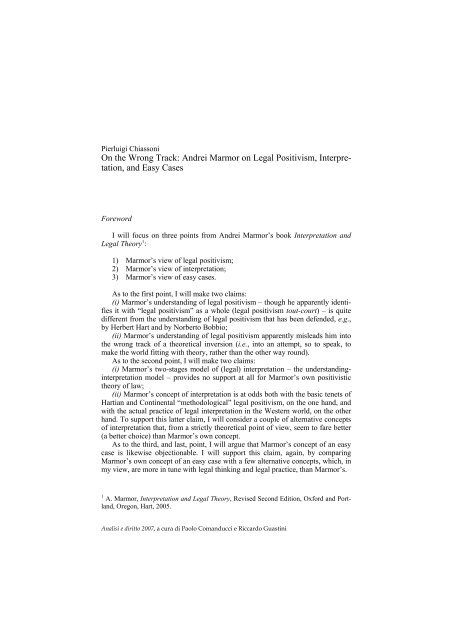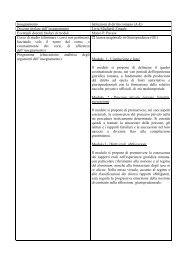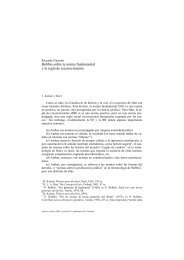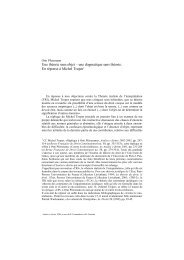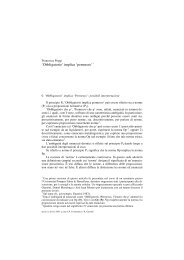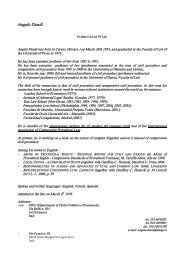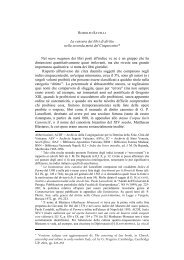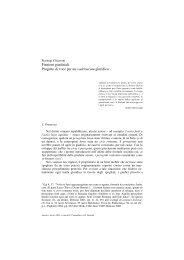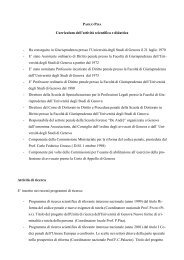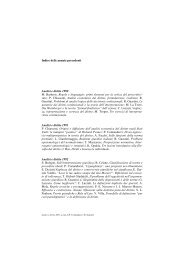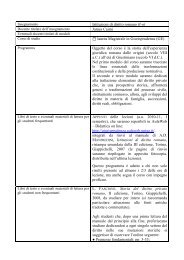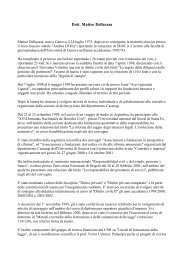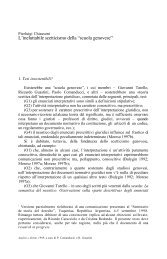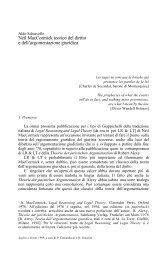On the Wrong Track: Andrei Marmor on Legal Positivism, Interpre ...
On the Wrong Track: Andrei Marmor on Legal Positivism, Interpre ...
On the Wrong Track: Andrei Marmor on Legal Positivism, Interpre ...
You also want an ePaper? Increase the reach of your titles
YUMPU automatically turns print PDFs into web optimized ePapers that Google loves.
154grammar of “interpretati<strong>on</strong>” is <str<strong>on</strong>g>the</str<strong>on</strong>g> explicati<strong>on</strong> of just <strong>on</strong>e of <str<strong>on</strong>g>the</str<strong>on</strong>g> several meaningswhich <str<strong>on</strong>g>the</str<strong>on</strong>g> term “interpretati<strong>on</strong>” is being used to c<strong>on</strong>vey, in ordinary language aswell as in legal and philosophical essays.Since <str<strong>on</strong>g>the</str<strong>on</strong>g>re is not <strong>on</strong>e “grammar” of (just <strong>on</strong>e c<strong>on</strong>cept of) “interpretati<strong>on</strong>”, butmany grammars for many different c<strong>on</strong>cepts, <str<strong>on</strong>g>Marmor</str<strong>on</strong>g>’s argument is no argumentat all. It is, ra<str<strong>on</strong>g>the</str<strong>on</strong>g>r, <str<strong>on</strong>g>the</str<strong>on</strong>g> expressi<strong>on</strong> of his preference about a certain meaning of “interpretati<strong>on</strong>”he deems better, for some (good or bad) purpose of his own.(2) A pointless ficti<strong>on</strong>. Suppose we want to assess <str<strong>on</strong>g>the</str<strong>on</strong>g> value of <str<strong>on</strong>g>Marmor</str<strong>on</strong>g>’s c<strong>on</strong>ceptof interpretati<strong>on</strong> in its own right.In <str<strong>on</strong>g>the</str<strong>on</strong>g> wake of Grice, <str<strong>on</strong>g>Marmor</str<strong>on</strong>g> selects a communicati<strong>on</strong>-intenti<strong>on</strong> view about<str<strong>on</strong>g>the</str<strong>on</strong>g> sort of meaning “interpretati<strong>on</strong>” is meant to determine. Being aware of recenttrends in literary criticism and (perhaps) lawyers’ ways of looking at legal interpretati<strong>on</strong>,however, <str<strong>on</strong>g>Marmor</str<strong>on</strong>g> makes clear that “<str<strong>on</strong>g>the</str<strong>on</strong>g> author” may also be an utterlystipulated or fictitious entity.When <str<strong>on</strong>g>the</str<strong>on</strong>g> author is fictitious, <str<strong>on</strong>g>the</str<strong>on</strong>g> success of any piece of interpretati<strong>on</strong> depends– as <str<strong>on</strong>g>Marmor</str<strong>on</strong>g> makes clear – <strong>on</strong> <str<strong>on</strong>g>the</str<strong>on</strong>g> corresp<strong>on</strong>dence of <str<strong>on</strong>g>the</str<strong>on</strong>g> outcome of any piece ofinterpretati<strong>on</strong> to <str<strong>on</strong>g>the</str<strong>on</strong>g> «parameters» making up <str<strong>on</strong>g>the</str<strong>on</strong>g> fictitious author (for instance:what a good, rati<strong>on</strong>al, upright, coherence-oriented, completeness-oriented, comm<strong>on</strong>-wealpromoting, wise, not-vicious, legislator would have meant by a certainnorm-formulati<strong>on</strong>).In <str<strong>on</strong>g>the</str<strong>on</strong>g>se cases, <str<strong>on</strong>g>the</str<strong>on</strong>g> parameters of interpretati<strong>on</strong> are clearly what <str<strong>on</strong>g>the</str<strong>on</strong>g> interpreterthinks proper: <str<strong>on</strong>g>the</str<strong>on</strong>g>y corresp<strong>on</strong>d to <str<strong>on</strong>g>the</str<strong>on</strong>g> interpreter’s view about <str<strong>on</strong>g>the</str<strong>on</strong>g> correct way tointerpret a text all <str<strong>on</strong>g>the</str<strong>on</strong>g> way through.We have moved from intentio auctoris to intentio operis and, above all, to intentiolectoris. This fact, which <str<strong>on</strong>g>Marmor</str<strong>on</strong>g> clearly avows, is not a marginal phenomen<strong>on</strong>:it suggests that interpretati<strong>on</strong> is basically an interpreter’s game. It is <str<strong>on</strong>g>the</str<strong>on</strong>g>interpreter who sets <str<strong>on</strong>g>the</str<strong>on</strong>g> rules (<str<strong>on</strong>g>the</str<strong>on</strong>g> “parameters”): it is <str<strong>on</strong>g>the</str<strong>on</strong>g> interpreter who establisheswhich author, and which intenti<strong>on</strong>, are to be deemed relevant for a “properinterpretati<strong>on</strong> of a text”.In <str<strong>on</strong>g>the</str<strong>on</strong>g> light of <str<strong>on</strong>g>the</str<strong>on</strong>g>se remarks, <strong>on</strong>e may w<strong>on</strong>der why <str<strong>on</strong>g>Marmor</str<strong>on</strong>g> did not choose ac<strong>on</strong>cept of interpretati<strong>on</strong> that would bring this crucial point to <str<strong>on</strong>g>the</str<strong>on</strong>g> fore in a moredirect way.In o<str<strong>on</strong>g>the</str<strong>on</strong>g>r words: why should we buy a c<strong>on</strong>cept of interpretati<strong>on</strong>, like <str<strong>on</strong>g>Marmor</str<strong>on</strong>g>’s,with a built-in allowance for ficti<strong>on</strong>s?Apparently, a different c<strong>on</strong>cept of interpretati<strong>on</strong> would be more h<strong>on</strong>est andfruitful – and, I claim, more in tune with <str<strong>on</strong>g>the</str<strong>on</strong>g> basic tenets of methodological positivismI have recalled above (§ 1).C<strong>on</strong>sider, for instance, <str<strong>on</strong>g>the</str<strong>on</strong>g> following two c<strong>on</strong>cepts of interpretati<strong>on</strong>, as widgetsin <str<strong>on</strong>g>the</str<strong>on</strong>g> sober windows of a rival shop.Here you are a first c<strong>on</strong>cept.<strong>Interpre</strong>tati<strong>on</strong> is <str<strong>on</strong>g>the</str<strong>on</strong>g> ascripti<strong>on</strong> of meaning to a text according to <str<strong>on</strong>g>the</str<strong>on</strong>g> parametersof interpretive correctness selected by <str<strong>on</strong>g>the</str<strong>on</strong>g> interpreter.
155These parameters, as a matter of fact, may include reference to <str<strong>on</strong>g>the</str<strong>on</strong>g> literalmeaning of <str<strong>on</strong>g>the</str<strong>on</strong>g> text, and/or reference to <str<strong>on</strong>g>the</str<strong>on</strong>g> actual communicati<strong>on</strong>-intenti<strong>on</strong> of <str<strong>on</strong>g>the</str<strong>on</strong>g>actual author of <str<strong>on</strong>g>the</str<strong>on</strong>g> text, and/or reference to a counterfactual communicati<strong>on</strong>intenti<strong>on</strong>of <str<strong>on</strong>g>the</str<strong>on</strong>g> actual author of <str<strong>on</strong>g>the</str<strong>on</strong>g> text, and/or reference to a wholly made-upcommunicati<strong>on</strong>-intenti<strong>on</strong> of a fictitious author, and/or reference to values likereas<strong>on</strong>ableness, no-n<strong>on</strong>sense, coherence, completeness, justice, integrity, <str<strong>on</strong>g>the</str<strong>on</strong>g>comm<strong>on</strong> good, wealth-maximizati<strong>on</strong>, moral perfecti<strong>on</strong>, etc.This c<strong>on</strong>cept saves a lot from <str<strong>on</strong>g>Marmor</str<strong>on</strong>g>’s, except for two basic points.<str<strong>on</strong>g>On</str<strong>on</strong>g> <str<strong>on</strong>g>the</str<strong>on</strong>g> <strong>on</strong>e hand, <str<strong>on</strong>g>the</str<strong>on</strong>g> c<strong>on</strong>cept suggests that <str<strong>on</strong>g>the</str<strong>on</strong>g> literal (linguistic) meaning of asentence – though it may be a psychologically necessary item in <str<strong>on</strong>g>the</str<strong>on</strong>g> mind of <str<strong>on</strong>g>the</str<strong>on</strong>g>interpreters – needs not having any pride of place, from <str<strong>on</strong>g>the</str<strong>on</strong>g> perspective of interpretersand interpretive “<str<strong>on</strong>g>the</str<strong>on</strong>g>ories” (and methods), within <str<strong>on</strong>g>the</str<strong>on</strong>g> parameters of (allthings-c<strong>on</strong>sidered)interpretive correctness.<str<strong>on</strong>g>On</str<strong>on</strong>g> <str<strong>on</strong>g>the</str<strong>on</strong>g> o<str<strong>on</strong>g>the</str<strong>on</strong>g>r hand, <str<strong>on</strong>g>the</str<strong>on</strong>g> c<strong>on</strong>cept shows no exclusive commitment to a communicati<strong>on</strong>-intenti<strong>on</strong>view of sentence-meanings and, accordingly, no commitmentto a noti<strong>on</strong> of interpretati<strong>on</strong> with a built-in allowance for ficti<strong>on</strong>.Notice, in passing, that <str<strong>on</strong>g>the</str<strong>on</strong>g> c<strong>on</strong>cept of interpretati<strong>on</strong> above is not necessarilyc<strong>on</strong>nected to any form of interpretive nihilism whatsoever. In fact, <str<strong>on</strong>g>the</str<strong>on</strong>g> selecti<strong>on</strong>,by a given interpreter, of <str<strong>on</strong>g>the</str<strong>on</strong>g> proper parameters of interpretive correctness maynot be free. In fact, it may be a choice tightly c<strong>on</strong>trolled, for instance, by publicopini<strong>on</strong> at large, <str<strong>on</strong>g>the</str<strong>on</strong>g> opini<strong>on</strong> of fellow interpreters (<str<strong>on</strong>g>the</str<strong>on</strong>g> interpretive community),or even <str<strong>on</strong>g>the</str<strong>on</strong>g> wise will of <str<strong>on</strong>g>the</str<strong>on</strong>g> Dear Leader.Coming now to <str<strong>on</strong>g>the</str<strong>on</strong>g> law, and taking into account <str<strong>on</strong>g>the</str<strong>on</strong>g> ways jurists, judges, andlawyers go about when <str<strong>on</strong>g>the</str<strong>on</strong>g>y “interpret” a c<strong>on</strong>stituti<strong>on</strong>al clause, a statutory proviso,etc., a sec<strong>on</strong>d c<strong>on</strong>cept of interpretati<strong>on</strong> – again quite different from <str<strong>on</strong>g>Marmor</str<strong>on</strong>g>’s– may be outlined. C<strong>on</strong>sider <str<strong>on</strong>g>the</str<strong>on</strong>g> following.<strong>Interpre</strong>tati<strong>on</strong> is <str<strong>on</strong>g>the</str<strong>on</strong>g> ascripti<strong>on</strong> of meaning to a legally authoritative text accordingto <str<strong>on</strong>g>the</str<strong>on</strong>g> parameters of interpretive correctness selected by <str<strong>on</strong>g>the</str<strong>on</strong>g> interpreter.These parameters are represented by clusters of interpretive directives (interpretivecodes), that, as a matter of fact, may include reference to <str<strong>on</strong>g>the</str<strong>on</strong>g> literal meaningof <str<strong>on</strong>g>the</str<strong>on</strong>g> text, and/or reference to <str<strong>on</strong>g>the</str<strong>on</strong>g> actual communicati<strong>on</strong>-intenti<strong>on</strong> of <str<strong>on</strong>g>the</str<strong>on</strong>g> actualauthor of <str<strong>on</strong>g>the</str<strong>on</strong>g> text, and/or reference to a counterfactual communicati<strong>on</strong>intenti<strong>on</strong>of <str<strong>on</strong>g>the</str<strong>on</strong>g> actual author of <str<strong>on</strong>g>the</str<strong>on</strong>g> text, and/or reference to a wholly made-upcommunicati<strong>on</strong>-intenti<strong>on</strong> of a fictitious author, and/or reference to values likereas<strong>on</strong>ableness, no-n<strong>on</strong>sense, coherence, completeness, justice, integrity, <str<strong>on</strong>g>the</str<strong>on</strong>g>comm<strong>on</strong> good, wealth-maximizati<strong>on</strong>, moral perfecti<strong>on</strong>, etc.As a matter of fact, interpretive codes may be selected by interpreters out of agiven set of interpretive directives, ei<str<strong>on</strong>g>the</str<strong>on</strong>g>r in an ad hoc way, i.e., according to aparticular outcome at hand to be secured, or according to a basic and relativelystable methodological opti<strong>on</strong>, depending <strong>on</strong> value-judgments about <str<strong>on</strong>g>the</str<strong>on</strong>g> properway for an interpreter to perform her job within a such-and-such legal order.
156Whenever legal orders do c<strong>on</strong>tain norm-formulati<strong>on</strong>s c<strong>on</strong>cerning (c<strong>on</strong>stituti<strong>on</strong>al,statutory) interpretati<strong>on</strong>, <str<strong>on</strong>g>the</str<strong>on</strong>g>se are usually formulated in such a loose wayas to leave to <str<strong>on</strong>g>the</str<strong>on</strong>g> interpreters <str<strong>on</strong>g>the</str<strong>on</strong>g> ultimate resp<strong>on</strong>sibility about <str<strong>on</strong>g>the</str<strong>on</strong>g> “proper” set ofinterpretive directives to be used generally, or <strong>on</strong> an ad hoc basis.This latter c<strong>on</strong>cept of interpretati<strong>on</strong> I take as particularly suitable, in explicating<str<strong>on</strong>g>the</str<strong>on</strong>g> way lawyers (judges, law-professors, barristers, etc.) think about legal interpretati<strong>on</strong>.It is, fur<str<strong>on</strong>g>the</str<strong>on</strong>g>rmore, a general and value-free <str<strong>on</strong>g>the</str<strong>on</strong>g>oretical c<strong>on</strong>cept, in tune with<str<strong>on</strong>g>the</str<strong>on</strong>g> tenets of methodological positivism.3. <str<strong>on</strong>g>Marmor</str<strong>on</strong>g> <strong>on</strong> Easy CasesThe last piece of <str<strong>on</strong>g>Marmor</str<strong>on</strong>g>’s <str<strong>on</strong>g>the</str<strong>on</strong>g>ory I would like to discuss here is, as I said in<str<strong>on</strong>g>the</str<strong>on</strong>g> “Foreword”, <str<strong>on</strong>g>Marmor</str<strong>on</strong>g> <strong>on</strong> easy cases.Like in <str<strong>on</strong>g>the</str<strong>on</strong>g> previous secti<strong>on</strong>, I will proceed as follows. First, I will analyse<str<strong>on</strong>g>Marmor</str<strong>on</strong>g>’s c<strong>on</strong>cept of an “easy case” (§ 3.1). Sec<strong>on</strong>dly, I will outline a couple ofalternative c<strong>on</strong>cepts that, in my opini<strong>on</strong>, fare better than <str<strong>on</strong>g>Marmor</str<strong>on</strong>g>’s, from <str<strong>on</strong>g>the</str<strong>on</strong>g>viewpoint of <str<strong>on</strong>g>the</str<strong>on</strong>g> basic tenets of methodological legal positivism (§ 3.2).3.1. <str<strong>on</strong>g>Marmor</str<strong>on</strong>g>’s ViewWe have already seen why <str<strong>on</strong>g>Marmor</str<strong>on</strong>g> attaches such a special importance to easycases 12 , suggesting that he may be <strong>on</strong> a wr<strong>on</strong>g track.Here, I am interested in assessing <str<strong>on</strong>g>the</str<strong>on</strong>g> <str<strong>on</strong>g>the</str<strong>on</strong>g>oretical value of <str<strong>on</strong>g>Marmor</str<strong>on</strong>g>’s c<strong>on</strong>ceptof an easy case in its own right, i.e., apart from <str<strong>on</strong>g>the</str<strong>on</strong>g> peculiar <str<strong>on</strong>g>the</str<strong>on</strong>g>oretical jobs it wasmeant to do.<str<strong>on</strong>g>Marmor</str<strong>on</strong>g> characterizes an “easy case” as follows 13 :An ‘easy case’ [...] means that <str<strong>on</strong>g>the</str<strong>on</strong>g> relevant legal norm can simply be understood, andapplied to <str<strong>on</strong>g>the</str<strong>on</strong>g> particular case without <str<strong>on</strong>g>the</str<strong>on</strong>g> mediati<strong>on</strong> of <str<strong>on</strong>g>the</str<strong>on</strong>g> interpretati<strong>on</strong> of <str<strong>on</strong>g>the</str<strong>on</strong>g> norm;we just understand what <str<strong>on</strong>g>the</str<strong>on</strong>g> law says, and know that it applies, or not, to <str<strong>on</strong>g>the</str<strong>on</strong>g> case athand.12 A. <str<strong>on</strong>g>Marmor</str<strong>on</strong>g>, <strong>Interpre</strong>tati<strong>on</strong> and <strong>Legal</strong> Theory, pp. 95-96: «<strong>Legal</strong> positivism cannot accept<str<strong>on</strong>g>the</str<strong>on</strong>g> view that law is always subject to interpretati<strong>on</strong> [...] <strong>Legal</strong> positivism is committedto <str<strong>on</strong>g>the</str<strong>on</strong>g> <str<strong>on</strong>g>the</str<strong>on</strong>g>sis that a distincti<strong>on</strong> exists between (so-called) “easy cases”, where <str<strong>on</strong>g>the</str<strong>on</strong>g> law canbe simply understood, and applied straightforwardly, and “hard cases”, where <str<strong>on</strong>g>the</str<strong>on</strong>g> issue isnot determined by <str<strong>on</strong>g>the</str<strong>on</strong>g> existing legal standards [...] To a greater or lesser extent, judges participate,through <str<strong>on</strong>g>the</str<strong>on</strong>g>ir interpretive activities, in <str<strong>on</strong>g>the</str<strong>on</strong>g> process of modifying and creating law.First, however, <str<strong>on</strong>g>the</str<strong>on</strong>g>re must be a law <str<strong>on</strong>g>the</str<strong>on</strong>g>re to interpret».13 A. <str<strong>on</strong>g>Marmor</str<strong>on</strong>g>, <strong>Interpre</strong>tati<strong>on</strong> and <strong>Legal</strong> Theory, p. 97.
157By way of a tentative analysis, <str<strong>on</strong>g>Marmor</str<strong>on</strong>g>’s c<strong>on</strong>cept of an easy case is liable todifferent readings. Indeed, <str<strong>on</strong>g>the</str<strong>on</strong>g> relevant legal norm-formulati<strong>on</strong> (in <str<strong>on</strong>g>Marmor</str<strong>on</strong>g>’sterms “legal norm”) “can” «simply be understood and applied» in not less thanthree different ways.(1) Linguistic-can: <str<strong>on</strong>g>the</str<strong>on</strong>g> relevant norm-formulati<strong>on</strong> is liable, by means of asimple understanding (literal reading), to provide <str<strong>on</strong>g>the</str<strong>on</strong>g> judge with a legal norm underwhich a case at hand clearly may (or may not) be subsumed.(2) Methodological-can: if a judge limits herself (a) to a literal reading of <str<strong>on</strong>g>the</str<strong>on</strong>g>relevant norm-formulati<strong>on</strong> and (b) to <str<strong>on</strong>g>the</str<strong>on</strong>g> applicati<strong>on</strong> of <str<strong>on</strong>g>the</str<strong>on</strong>g> literal norm to a caseat hand, her way of proceeding may be regarded as fully justified according to aset of interpretive directives (interpretive <str<strong>on</strong>g>the</str<strong>on</strong>g>ory, interpretive code), <str<strong>on</strong>g>the</str<strong>on</strong>g> judge herselfmay invoke as <str<strong>on</strong>g>the</str<strong>on</strong>g> “proper” set.Notice that from this perspective, stopping at <str<strong>on</strong>g>the</str<strong>on</strong>g> simple understanding of anorm-formulati<strong>on</strong> is not <strong>on</strong>ly a linguistic possibility (linguistic-can); it is also allowed,and justified, by a set of interpretive directives (interpretive <str<strong>on</strong>g>the</str<strong>on</strong>g>ory, interpretivecode) <str<strong>on</strong>g>the</str<strong>on</strong>g> judge deems proper.(3) Sociological-can: if a judge limits herself (a) to a literal reading of <str<strong>on</strong>g>the</str<strong>on</strong>g> relevantnorm-formulati<strong>on</strong> and (b) to <str<strong>on</strong>g>the</str<strong>on</strong>g> applicati<strong>on</strong> of <str<strong>on</strong>g>the</str<strong>on</strong>g> literal norm to a case athand, her way of proceeding will be praised as reas<strong>on</strong>able, good, proper, fully justified,etc., by fellow judges, and/or competent jurists, and/or society-at-large, etc.Notice that from this perspective, stopping at <str<strong>on</strong>g>the</str<strong>on</strong>g> simple understanding of anorm-formulati<strong>on</strong> is not <strong>on</strong>ly a linguistic possibility (linguistic-can), nor a simplemethodological possibility (methodological-can); it is also a course of acti<strong>on</strong> thatis in tune with (and allowed, approved, justified by) <str<strong>on</strong>g>the</str<strong>on</strong>g> methodological normativeattitudes of <str<strong>on</strong>g>the</str<strong>on</strong>g> generality of <str<strong>on</strong>g>the</str<strong>on</strong>g> relevant interpretive community, <str<strong>on</strong>g>the</str<strong>on</strong>g> publicopini<strong>on</strong>, etc.A few remarks are in order.<str<strong>on</strong>g>Marmor</str<strong>on</strong>g>’s noti<strong>on</strong> of an easy case apparently mirrors <str<strong>on</strong>g>the</str<strong>on</strong>g> first view (linguisticcan).Accordingly, his c<strong>on</strong>cept of an easy case purports to be a purely linguistic<strong>on</strong>e, fully detached from interpretive directives, ideologies, and social attitudes.These latter ingredients, however, are part of <str<strong>on</strong>g>the</str<strong>on</strong>g> stock-in-trade of <str<strong>on</strong>g>the</str<strong>on</strong>g> legal interpretati<strong>on</strong>business, at least in our present legal cultures. Accordingly, a <str<strong>on</strong>g>the</str<strong>on</strong>g>oreticallyproper c<strong>on</strong>cept of an easy case should somehow account for <str<strong>on</strong>g>the</str<strong>on</strong>g>m.From <str<strong>on</strong>g>the</str<strong>on</strong>g> methodological perspective of <str<strong>on</strong>g>the</str<strong>on</strong>g> tools of legal interpretati<strong>on</strong> andso-called interpretati<strong>on</strong> <str<strong>on</strong>g>the</str<strong>on</strong>g>ories, simple understanding (literal meaning) needs notto be – and rarely is – <str<strong>on</strong>g>the</str<strong>on</strong>g> whole story about <str<strong>on</strong>g>the</str<strong>on</strong>g> reading of norm-formulati<strong>on</strong>s.Accordingly, <str<strong>on</strong>g>Marmor</str<strong>on</strong>g>’s c<strong>on</strong>ceptual proposal about “easy cases” faces <str<strong>on</strong>g>the</str<strong>on</strong>g> followingdilemma.Ei<str<strong>on</strong>g>the</str<strong>on</strong>g>r it is a genuine <str<strong>on</strong>g>the</str<strong>on</strong>g>oretical definiti<strong>on</strong> of an “easy case”, purporting to capturejudges’ and jurists’ general idea about it; but, in such a case, it is clearly false.
158Or it is tantamount to a claim – to a piece of a normative <str<strong>on</strong>g>the</str<strong>on</strong>g>ory of legal interpretati<strong>on</strong>– according to which, when a norm-formulati<strong>on</strong>, by a literal reading(simple understanding), is applicable to a case at hand, it ought to be applied to it,comes what may: even though it is at odds with c<strong>on</strong>stituti<strong>on</strong>al principles or o<str<strong>on</strong>g>the</str<strong>on</strong>g>rhigher norms, it carries unwelcome c<strong>on</strong>sequences, or, in <str<strong>on</strong>g>the</str<strong>on</strong>g> negative case, it presents<str<strong>on</strong>g>the</str<strong>on</strong>g> law as gappy.3.2. Two Alternative C<strong>on</strong>cepts<str<strong>on</strong>g>Marmor</str<strong>on</strong>g>’s c<strong>on</strong>cept has a few competitors, which, from a <str<strong>on</strong>g>the</str<strong>on</strong>g>oretical viewpoint,may be regarded as preferable.Let’s have a very quick look at <str<strong>on</strong>g>the</str<strong>on</strong>g>m.Methodological easy case:(a) <str<strong>on</strong>g>the</str<strong>on</strong>g> relevant norm-formulati<strong>on</strong> has a clear and determinate literal meaning;(b) <str<strong>on</strong>g>the</str<strong>on</strong>g> clear and determinate literal meaning is all-things-c<strong>on</strong>sidered justifiedfrom <str<strong>on</strong>g>the</str<strong>on</strong>g> point of view of <str<strong>on</strong>g>the</str<strong>on</strong>g> proper set of interpretive directives (interpretivecode);(c) <str<strong>on</strong>g>the</str<strong>on</strong>g> clear and determinate literal meaning does clearly fit (not fit) with acase at hand.Sociological easy case:(a) <str<strong>on</strong>g>the</str<strong>on</strong>g> relevant norm-formulati<strong>on</strong> has a settled meaning within <str<strong>on</strong>g>the</str<strong>on</strong>g> legal professi<strong>on</strong>(and/or society-at-large) – which, by <str<strong>on</strong>g>the</str<strong>on</strong>g> way, may also be quite differentfrom its literal meaning;(b) <str<strong>on</strong>g>the</str<strong>on</strong>g> settled meaning can be discovered by looking at <str<strong>on</strong>g>the</str<strong>on</strong>g> past interpretati<strong>on</strong>sof <str<strong>on</strong>g>the</str<strong>on</strong>g> norm-formulati<strong>on</strong> by judges and jurists;(c) <str<strong>on</strong>g>the</str<strong>on</strong>g> settled meaning does clearly fit (not fit) with a case at hand;(d) any different interpretati<strong>on</strong> of <str<strong>on</strong>g>the</str<strong>on</strong>g> relevant norm-formulati<strong>on</strong> would be regardedby <str<strong>on</strong>g>the</str<strong>on</strong>g> legal professi<strong>on</strong> (and/or society-at-large) as <str<strong>on</strong>g>the</str<strong>on</strong>g> outcome of ignorance,mistake, unreas<strong>on</strong>ableness, or sheer arbitrariness <strong>on</strong> <str<strong>on</strong>g>the</str<strong>on</strong>g> part of <str<strong>on</strong>g>the</str<strong>on</strong>g> legalpractiti<strong>on</strong>er.Both c<strong>on</strong>cepts take into account a wider set of features from legal thinkingand legal experience than <str<strong>on</strong>g>Marmor</str<strong>on</strong>g>’s. Both c<strong>on</strong>cepts are value-free from <str<strong>on</strong>g>the</str<strong>on</strong>g> perspectiveof normative <str<strong>on</strong>g>the</str<strong>on</strong>g>ories of interpretati<strong>on</strong>. Both, in my view, fare better than<str<strong>on</strong>g>Marmor</str<strong>on</strong>g>’s, from <str<strong>on</strong>g>the</str<strong>on</strong>g> point of view of <str<strong>on</strong>g>the</str<strong>on</strong>g> basic tenets of methodological positivism.


